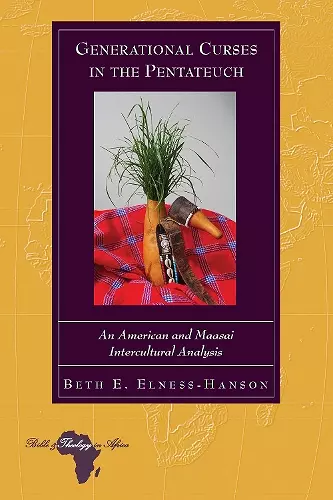Generational Curses in the Pentateuch
An American and Maasai Intercultural Analysis
Beth E Elness-Hanson author Knut Holter editor
Format:Hardback
Publisher:Peter Lang Publishing Inc
Published:4th Oct '17
Currently unavailable, and unfortunately no date known when it will be back

Although the demographics of World Christianity demonstrate a population shift to the Global South, especially in Sub-Saharan Africa, the preponderance of biblical scholarship continues to be dominated by Western scholars in pursuit of their contextual questions that are influenced by an Enlightenment-oriented worldview. Unfortunately, nascent methodologies used to bridge this chasm often continue to marginalize indigenous voices. In contradistinction, Beth E. Elness-Hanson’s research challenges biblical scholars to engage stronger methods for dialogue with global voices, as well as encourages Majority World scholars to share their perspectives with the West.
Elness-Hanson’s fundamental question is: How do we more fully understand the “generational curses” in the Pentateuch? The phrase, “visiting the iniquity of the fathers on the children to the third and the fourth generation,” appears four times in the Pentateuch: Exod 20:4–6; Exod 34:6–7; Num 14:18; and Deut 5:8–10. While generational curses remain prevalent within the Maasai worldview in East Africa, an Enlightenment-influenced worldview diminishes curses as a phenomenon. However, fuller understandings develop as we listen and learn from each other.
This research develops a theoretical framework from Hans-Georg Gadamer’s “fusion of horizons” and applies it through Ellen Herda’s anthropological protocol of “participatory inquiry.” The resulting dialogue with Maasai theologians in Tanzania, builds bridges of understanding across cultures. Elness-Hanson’s intercultural analysis of American and Maasai interpretations of the Pentateuchal texts on the generational curses demonstrates that intercultural dialogues increase understandings, which otherwise are limited by one worldview.
“This volume represents an exemplary exercise in the religious-theological paradigm of interpretation within the spectrum of contemporary biblical criticism. Its framework is that of World Christianity, described in terms of an ever greater presence of the Global South alongside enduring marginalization in interpretation on the part of the Global North. Its approach is that of intercultural criticism, bringing voices together from different areas of the world for dialogue. Indeed, the exercise proves quite successful in every respect. The result is a most insightful reading of both the Maasai and American interpretations in context, with mutual illumination of both in the process. The result is also a most persuasive argument for diversity in the critical task. Altogether, therefore, Beth E. Elness-Hanson has produced an excellent example of intercultural analysis and issued an excellent call for dialogical reading within World Christianity at all levels, academic as well as popular.”—Fernando F. Segovia, Oberlin Graduate Professor of New Testament and Early Christianity, Vanderbilt University
“Refusing to ‘Other’ the historically disenfranchised voices such as African voices and through her employ of what she has called a ‘dialogical’ exegesis and a ‘contextual conceptual paradigm of reconciliation,’ Beth E. Elness-Hanson has ably and convincingly re-read the four generational curses in the Pentateuch through the lenses of the Maasai and American interpreters within the framework of intercultural hermeneutics. A refreshing study on the generational curses indeed!”—Madipoane Masenya (ngwan’a Mphahlele), Professor of Old Testament Studies, Department of Biblical and Ancient Studies, University of South Africa
“This book is a must for everyone who is interested in intercultural biblical hermeneutics and dialogue, and it offers insights that will both excite and challenge the reader. Beth E. Elness-Hanson provides the reader with valuable theoretical perspectives and practical methods for doing exegesis across boundaries. The volume shows how an awareness of other ways of interpreting a text can add to the author’s own perspective, and can thus challenge the reader to rethink own hermeneutical perspectives.”—Marta Høyland Lavik, Professor of Biblical Studies, VID Specialized University/Stavanger University Hospital, Stavanger, Norway
ISBN: 9781433141218
Dimensions: unknown
Weight: 550g
292 pages
New edition